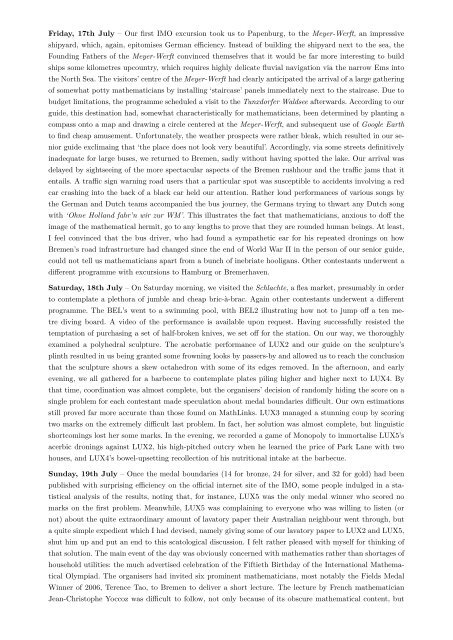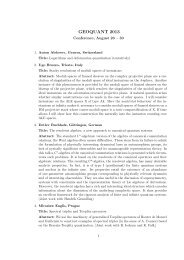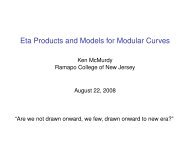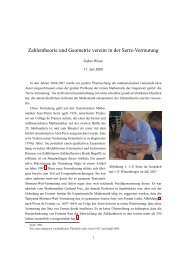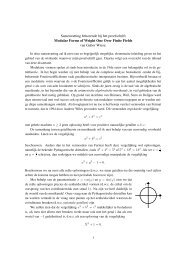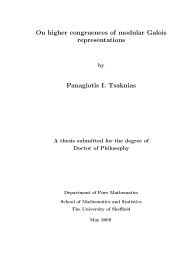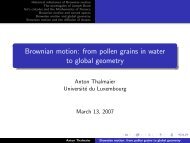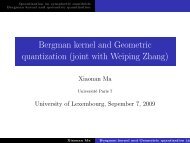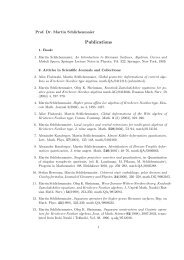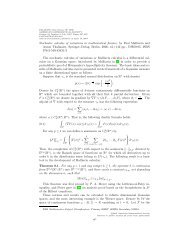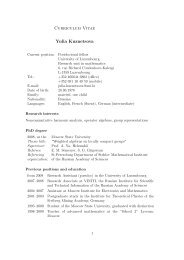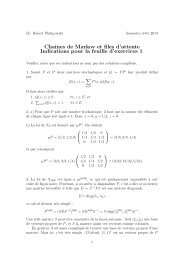THE 50th INTERNATIONAL MATHEMATICAL OLYMPIAD
THE 50th INTERNATIONAL MATHEMATICAL OLYMPIAD
THE 50th INTERNATIONAL MATHEMATICAL OLYMPIAD
You also want an ePaper? Increase the reach of your titles
YUMPU automatically turns print PDFs into web optimized ePapers that Google loves.
Friday, 17th July – Our first IMO excursion took us to Papenburg, to the Meyer-Werft, an impressive<br />
shipyard, which, again, epitomises German efficiency. Instead of building the shipyard next to the sea, the<br />
Founding Fathers of the Meyer-Werft convinced themselves that it would be far more interesting to build<br />
ships some kilometres upcountry, which requires highly delicate fluvial navigation via the narrow Ems into<br />
the North Sea. The visitors’ centre of the Meyer-Werft had clearly anticipated the arrival of a large gathering<br />
of somewhat potty mathematicians by installing ‘staircase’ panels immediately next to the staircase. Due to<br />
budget limitations, the programme scheduled a visit to the Tunxdorfer Waldsee afterwards. According to our<br />
guide, this destination had, somewhat characteristically for mathematicians, been determined by planting a<br />
compass onto a map and drawing a circle centered at the Meyer-Werft, and subsequent use of Google Earth<br />
to find cheap amusement. Unfortunately, the weather prospects were rather bleak, which resulted in our se-<br />
nior guide exclimaing that ‘the place does not look very beautiful’. Accordingly, via some streets definitively<br />
inadequate for large buses, we returned to Bremen, sadly without having spotted the lake. Our arrival was<br />
delayed by sightseeing of the more spectacular aspects of the Bremen rushhour and the traffic jams that it<br />
entails. A traffic sign warning road users that a particular spot was susceptible to accidents involving a red<br />
car crashing into the back of a black car held our attention. Rather loud performances of various songs by<br />
the German and Dutch teams accompanied the bus journey, the Germans trying to thwart any Dutch song<br />
with ‘Ohne Holland fahr’n wir zur WM’. This illustrates the fact that mathematicians, anxious to doff the<br />
image of the mathematical hermit, go to any lengths to prove that they are rounded human beings. At least,<br />
I feel convinced that the bus driver, who had found a sympathetic ear for his repeated dronings on how<br />
Bremen’s road infrastructure had changed since the end of World War II in the person of our senior guide,<br />
could not tell us mathematicians apart from a bunch of inebriate hooligans. Other contestants underwent a<br />
different programme with excursions to Hamburg or Bremerhaven.<br />
Saturday, 18th July – On Saturday morning, we visited the Schlachte, a flea market, presumably in order<br />
to contemplate a plethora of jumble and cheap bric-à-brac. Again other contestants underwent a different<br />
programme. The BEL’s went to a swimming pool, with BEL2 illustrating how not to jump off a ten me-<br />
tre diving board. A video of the performance is available upon request. Having successfully resisted the<br />
temptation of purchasing a set of half-broken knives, we set off for the station. On our way, we thoroughly<br />
examined a polyhedral sculpture. The acrobatic performance of LUX2 and our guide on the sculpture’s<br />
plinth resulted in us being granted some frowning looks by passers-by and allowed us to reach the conclusion<br />
that the sculpture shows a skew octahedron with some of its edges removed. In the afternoon, and early<br />
evening, we all gathered for a barbecue to contemplate plates piling higher and higher next to LUX4. By<br />
that time, coordination was almost complete, but the organisers’ decision of randomly hiding the score on a<br />
single problem for each contestant made speculation about medal boundaries difficult. Our own estimations<br />
still proved far more accurate than those found on MathLinks. LUX3 managed a stunning coup by scoring<br />
two marks on the extremely difficult last problem. In fact, her solution was almost complete, but linguistic<br />
shortcomings lost her some marks. In the evening, we recorded a game of Monopoly to immortalise LUX5’s<br />
acerbic dronings against LUX2, his high-pitched outcry when he learned the price of Park Lane with two<br />
houses, and LUX4’s bowel-upsetting recollection of his nutritional intake at the barbecue.<br />
Sunday, 19th July – Once the medal boundaries (14 for bronze, 24 for silver, and 32 for gold) had been<br />
published with surprising efficiency on the official internet site of the IMO, some people indulged in a sta-<br />
tistical analysis of the results, noting that, for instance, LUX5 was the only medal winner who scored no<br />
marks on the first problem. Meanwhile, LUX5 was complaining to everyone who was willing to listen (or<br />
not) about the quite extraordinary amount of lavatory paper their Australian neighbour went through, but<br />
a quite simple expedient which I had devised, namely giving some of our lavatory paper to LUX2 and LUX5,<br />
shut him up and put an end to this scatological discussion. I felt rather pleased with myself for thinking of<br />
that solution. The main event of the day was obviously concerned with mathematics rather than shortages of<br />
household utilities: the much advertised celebration of the Fiftieth Birthday of the International Mathema-<br />
tical Olympiad. The organisers had invited six prominent mathematicians, most notably the Fields Medal<br />
Winner of 2006, Terence Tao, to Bremen to deliver a short lecture. The lecture by French mathematician<br />
Jean-Christophe Yoccoz was difficult to follow, not only because of its obscure mathematical content, but


